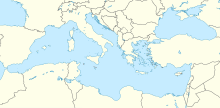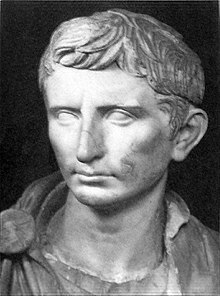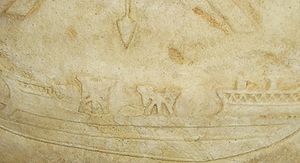
Gaius Julius Caesar Augustus, also known as Octavian, was the founder of the Roman Empire. He reigned as the first Roman emperor from 27 BC until his death in AD 14. The reign of Augustus initiated an imperial cult, as well as an era of imperial peace in which the Roman world was largely free of armed conflict. The Principate system of government was established during his reign and lasted until the Crisis of the Third Century.

The Battle of Actium was a naval battle fought between Octavian's maritime fleet, led by Marcus Agrippa, and the combined fleets of both Mark Antony and Cleopatra. The battle took place on 2 September 31 BC in the Ionian Sea, near the former Roman colony of Actium, Greece, and was the climax of over a decade of rivalry between Octavian and Antony.

Marcus Antonius, commonly known in English as Mark Antony, was a Roman politician and general who played a critical role in the transformation of the Roman Republic from a constitutional republic into the autocratic Roman Empire.
This article concerns the period 39 BC – 30 BC.

This article concerns the period 49 BC – 40 BC.
Year 32 BC was either a common year starting on Monday or Tuesday or a leap year starting on Sunday, Monday or Tuesday of the Julian calendar and a common year starting on Monday of the Proleptic Julian calendar. At the time, it was known as the Year of the Consulship of Ahenobarbus and Sosius. The denomination 32 BC for this year has been used since the early medieval period, when the Anno Domini calendar era became the prevalent method in Europe for naming years.
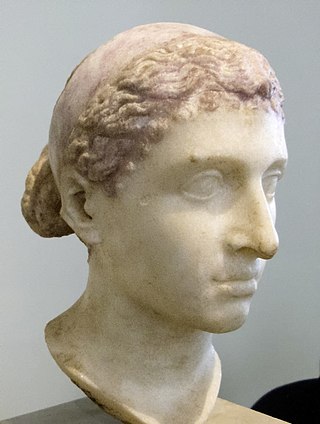
Cleopatra VII Thea Philopator was Queen of the Ptolemaic Kingdom of Egypt from 51 to 30 BC, and its last active ruler. A member of the Ptolemaic dynasty, she was a descendant of its founder Ptolemy I Soter, a Macedonian Greek general and companion of Alexander the Great. Her first language was Koine Greek, and she is the only Ptolemaic ruler known to have learned the Egyptian language. After her death, Egypt became a province of the Roman Empire, marking the end of the last Hellenistic-period state in the Mediterranean, a period which had lasted since the reign of Alexander.

The Second Triumvirate was an extraordinary commission and magistracy created at the end of the Roman republic for Mark Antony, Lepidus, and Octavian to give them practically absolute power. It was formally constituted by law on 27 November 43 BC with a term of five years; it was renewed in 37 BC for another five years before expiring in 32 BC. Constituted by the lex Titia, the triumvirs were given broad powers to make or repeal legislation, issue judicial punishments without due process or right of appeal, and appoint all other magistrates. The triumvirs also split the Roman world into three sets of provinces.

Gnaeus Domitius Ahenobarbus was a general and politician of ancient Rome in the 1st century BC.

Alexander Helios was a Ptolemaic prince and son of Pharaoh Cleopatra VII of the Ptolemaic dynasty and Roman triumvir Mark Antony. Alexander's fraternal twin sister was Cleopatra Selene II. Cleopatra named her son after Alexander the Great. His second name in Ancient Greek means "Sun"; this was the counterpart of his twin sister's second name Selene (Σελήνη), meaning "Moon".
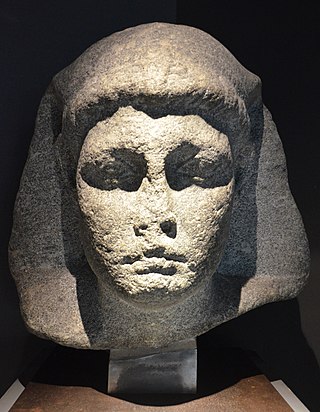
Ptolemy XV Caesar, nicknamed Caesarion, was the last pharaoh of Ptolemaic Egypt, reigning with his mother Cleopatra VII from 2 September 44 BC until her death by 12 August 30 BC, then as sole ruler until his death was ordered by Octavian.
Ptolemy Philadelphus was a Ptolemaic prince and was the youngest and fourth child of Greek Ptolemaic Queen Cleopatra VII of Egypt, and her third with Roman Triumvir Mark Antony.

The Donations of Alexandria was a political act by Cleopatra VII and Mark Antony in which they distributed lands held by Rome and Parthia among Cleopatra's children and gave them many titles, especially for Caesarion, the son of Julius Caesar. This was the second of two such donations; a similar donation ceremony had taken place two years earlier at Antioch in 36 BC, at which time the donations enjoyed Octavian's full approval of the Antonine strategy of dominating the East by exploiting Cleopatra's unique royal Seleucid lineage in the donated territories. Ultimately, the Donations caused a fatal rupture in Antonine relations with Rome and were one of the causes of the final war of the Roman Republic.
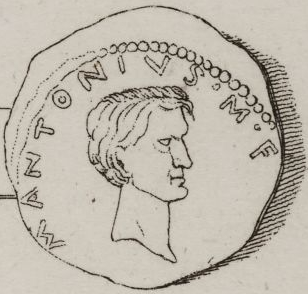
Marcus Antonius Antyllus was a son of the Roman Triumvir Marc Antony. He was also called Antyllus, a nickname given to him by his father meaning "the Archer". Despite his three children by Cleopatra, Marc Antony designated Antyllus as his official heir, a requirement under Roman law and a designation that probably contributed to his execution at age 17 by Octavian.

Cleopatra Selene II was a Ptolemaic princess, Queen of Numidia and Mauretania and Queen of Cyrenaica. She was an important royal woman in the early Augustan age.

The War of Actium was the last civil war of the Roman Republic, fought between Mark Antony and Octavian. In 32 BC, Octavian convinced the Roman Senate to declare war on the Egyptian queen Cleopatra. Her lover and ally Mark Antony, who was Octavian's rival, gave his support for her cause. Forty percent of the Roman Senate, together with both consuls, left Rome to join the war on Antony's side. After a decisive victory for Octavian at the Battle of Actium, Cleopatra and Antony withdrew to Alexandria, where Octavian besieged the city until both Antony and Cleopatra were forced to commit suicide.

The Cleopatras is a 1983 BBC Television eight-part historical drama serial. Written by Philip Mackie, it is set in Ancient Egypt during the latter part of the Ptolemaic Dynasty with an emphasis on the Cleopatras. Intended to be the I, Claudius of the 1980s, The Cleopatras met with a decidedly mixed critical reaction. It was regarded and portrayed as a gaudy farce.
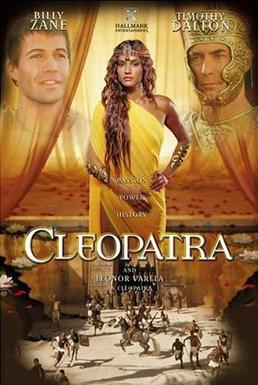
Cleopatra is a 1999 miniseries adaptation of Margaret George's 1997 historical fiction novel The Memoirs of Cleopatra. Produced by Hallmark Entertainment, it stars Leonor Varela as the Egyptian queen Cleopatra, Timothy Dalton as Julius Caesar, Billy Zane as Mark Antony, Rupert Graves as Octavius, Sean Pertwee as Brutus and Bruce Payne as Cassius. Cleopatra was shown first on the ABC television network in two parts on two consecutive evenings in May 1999 and then released on videotape and DVD. Judy Farr, Martin Hitchcock and Frank Walsh were nominated for an Emmy in 1999 for outstanding art direction for a miniseries or a movie for their work on Cleopatra.
Gaius Sosius was a Roman general and politician who featured in the wars of the late Republic as a staunch supporter of Mark Antony. Under the latter's patronage he held important state offices and military commands, serving as governor of Syria and leading the expedition to install Herod as king of Judea. Sosius was consul in the year 32 BC, when the Second Triumvirate lapsed and open conflict erupted between the triumvirs Antony and Octavian. Upon taking office, Sosius opposed Octavian in the Senate, for which he was forced to flee Rome.

The reign of Cleopatra VII of the Ptolemaic Kingdom of Egypt began with the death of her father, Ptolemy XII Auletes, by March 51 BC. It ended with her suicide in August 30 BC, which also marked the conclusion of the Hellenistic period and the annexation of Egypt into a Roman province. In the style of her Greek predecessors, Cleopatra reigned over Egypt and other territories as an absolute monarch, although the Roman Republic frequently interfered in its affairs. Her personal rule of Egypt was characterized by a continued reliance on agriculture, extensive trade and conflict with other states, the tackling of corruption, strategic management of the bureaucracy, and ambitious building projects.

